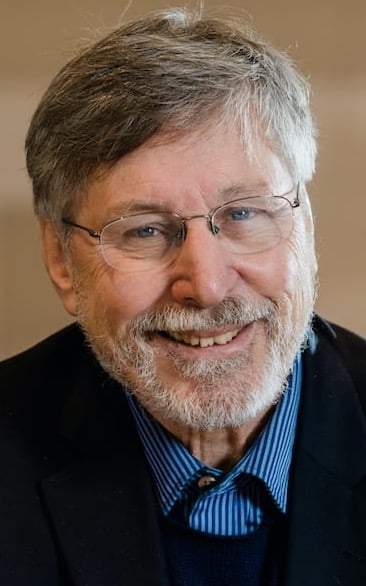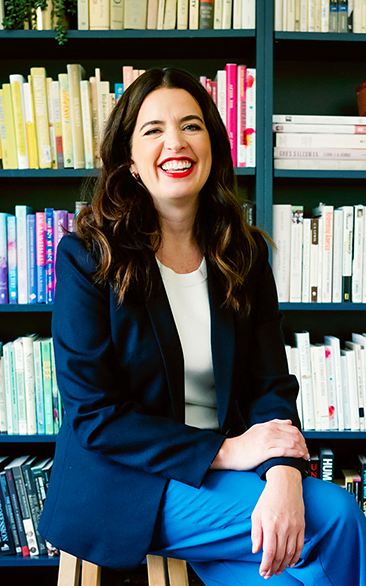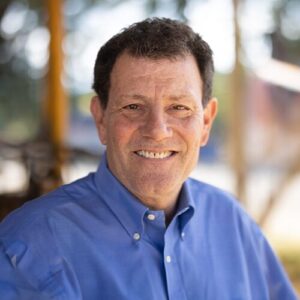Kate Bowler: I’m Kate Bowler, and this is Everything Happens. I’m a historian, author, aggressively, fast walker. But lately, in a world that promises endless progress, even now in a pandemic, I realized I just need to be a person. It’s hard to give up on the feeling that the life you want is just out of reach. If only you tried to eat this food, find that relationship, just get the kids graduated or the parents this kind of care. Only then will I feel different, better. Whole. But that’s not the way this works. When I was 35, I was diagnosed with stage four cancer. And here’s the very fun thing about that. The world loves you better when you are shiny, when you are cheerful, when you still believe that your best life now is right around the corner. I’ve written multiple books on the history of the idea that you can always fix your life. So I’m going to be the one to say it. There are some things we can change and some things we can’t. And it’s OK that life isn’t always getting better. We can have beauty and meaning, community and love, and we will need each other if we’re going to tell the truth. Life is a chronic condition and there’s no cure for being human.
Kate: We are all living in the past, at least every now and then. Nostalgia, the stories we tell, the high school reunions that happen all the time on Facebook. We are a memory book, but what happens if we get stuck there? Today, we’re talking about trauma and the way it keeps us stuck, the way it continues to organize our experiences and our thoughts and our reactions as if our past is still happening, some unchangeable and immutable past, something that seems to reach out into the future, whether we want it to or not. Trauma, as our very esteemed guest today explains, compromises the brain area that communicates the actual physical and embodied feeling of being alive. If you want to learn more about the world of memory and the hope of change. This guest is for you. Dr. Bessel van der Kolk has spent his career studying how children and adults adapt to traumatic experiences and has worked tirelessly to develop effective treatments. His efforts resulted in the founding of the Trauma Center in Massachusetts that does research and offers nationwide training to a variety of people in caregiving, educational and mental health professions. He has taught at universities and hospitals around the world and is the author of the best selling book, and it is absolutely stunning, The Body Keeps the Score: brain, mind and body in the healing of trauma. I am so excited to have you today. When I was first diagnosed, your book was actually the first gift I received that was not trying to sell me a magical cure for pain. So I’m just especially grateful for you.
Bessel van der Kolk: Terrific, I’m glad to be here.
Kate: Your work began when you studied Vietnam vets at the VA in the 1970s. What did you see when you began this work?
Bessel van der Kolk: What we saw was a bunch of guys who a very short time ago must have been very competent and skillful, people who and something had been knocked out of them. And they were sort of frozen and terrified of themselves and they kept exploding in anger and rage, in an uncontrolled way. The chief complaint was, I have become a monster and nobody should be living with me basically. I was having babies at home around the same time. I noticed that my one and two year olds were behaving in much the same way. But when they had the temper tantrum, I was not worried because I knew they would sooner or later outgrow that. But I was not sure about this, about this 30 year old veterans of the war. And so I got very curious about what causes some brains to mature and minds and what causes some people to get stuck in being frozen and being trapped.
Kate: It sounds too like I only have a limited understanding of, like the history of diagnosis, but that there was no formal diagnosis of post-traumatic stress disorder at the time.
Bessel van der Kolk: No there was actually nothing like it. The phenomenon has been described of a known for at least 150 years now, but it keeps sort of being pushed, pushed away. It seems like people have a really hard time grasping how much how damaging life can be for some people.
Kate: Yeah, and so how do you define trauma broadly?
Bessel van der Kolk: The trauma is simply an experience that overwhelms coping mechanisms. It is so horrendous that you are just paralyzed and frozen, flailing around, which you basically lose your mind. There’s nothing you can do actually.
Kate: It’s unbearable. It’s intolerable. Yeah.
Bessel van der Kolk: It’s horrendous. So it’s not like tell be your trauma story. No. You cannot tell me your story because if you go there, you get to freaked out and too upset and too frozen to actually tell the whole thing to somebody.
Kate: A lot of folks in this community here have some experience with trauma, either as a patient in a sort of a complicated medical situation or as a caregiver or as someone who has entered into a profession that’s incredibly emotionally expensive. And one question we get a lot is about the people’s capacity for trauma. It seems that some people might go through a similar experience and are unfazed and other people are absolutely leveled. So what seems to make the difference are some people just born more resilient?
Bessel van der Kolk: Well, I wouldn’t quite put it that way, though, because nobody has the same experience. If we both were. But you become my best friend and you become my biggest comrade, which oftentimes happens in the war. Something happens to you. I’m going to be very affected by it. Well, if you and I go off to war together and we happen not to like each other very much,
Kate: Which would never happen, but continue.
Bessel van der Kolk: But but, you know, and something would happen to you, I’d go like, OK, that’s another one. So but the impact of it is so different from one person to another because there’s so many factors that go into it. And certainly temperamental factors are one thing, having been trained makes a huge experience so that for example, when you go to medical school you get really trained to deal with horrendous situations all the time. For example, right now with the coronavirus, people talk about it, medical professionals, the nurses as heroes. I don’t think they would consider themselves that because that’s what they opted for it. If you train for it, that’s what you expect and what you choose to some degree. And as long as you’re able to do what you need to do to do a good job, you’re by and large going to be OK. But if the insurance company denies you being able to do what you’re supposed to do. Or the hospital administrator doesn’t give you the equipment that you need, then you really get very messed up.
Kate: Yeah, yeah. The way you point in your work so often to the experience of helplessness seem to be such a theme.
Bessel van der Kolk: The natural thing for people when we get exposed to lousy stuff, which is happens to everybody some of the time in their lives, some people more than others, is to run and to flee and to get the hell out of there or punch someone in the mouth, which your little brother may have done to you. But if those avenues of fight and flight are cut off when something goes really wrong and usually has to do with being held down, being mobilized, yeah. It’s just standing helplessly by. When something horrendous is happening, it crosses the street and gets cut off. But you just said they’re going, oh, why is it oh my God. Experience like, yeah, there’s nothing I can do to to change the situation.
Kate: Yeah. The ability to do something. Yeah. That sounds right.
Bessel van der Kolk: In basic training at the army, training for the police and training for fire people and doctors, nurses, we get training to always think about what you should do next. And so that you see something, for example, either a very vivid memory of as a medical student or as an intern. There was a three year old kid was brought in with burn wounds, all over his body is a horrendous thing to look at. But I was trained enough to go, OK, the kids get dehydrated when somebody goes to give me some fluids into him. So my training had prepared me to do something. And that’s a very critical issue. And of course, once soldiers get treated, other people, of course, when you’re a patient, you go to a hospital, you’re not trained to take care of yourself or you do depend on other people to do it for you.
Kate Bowler: Yeah.
Kate: Another part of your work that I was so interested in is, is the way people integrate the experience that happened to them. So if, say, a trauma occurs at the hands of the people who are supposed to be taking care of you, then there’s some sort of fundamental inability to square like this is your role. This was my role. We were supposed to be a certain way and then we get sort of frozen.
Bessel van der Kolk: Yeah. So it is something that is not really central in people’s thinking about human beings, in our culture, in psychology. But we are relational creatures. And we are always thinking about the people we love, the people we’re close to. That’s really we are social creatures. We’re like monkeys with a big brain. And and so we we count on each other. That’s really what relationships and families are about. You can count on each other. And so if somebody who you talk to then suddenly starts hitting you or doing terrible things to you. You’re going like, oh my God, my whole system of security is . And I have nobody to go to because this is the person who was supposed to protect me.
Kate: Yeah. Yeah, that’s right.
Bessel van der Kolk: So the attachment issue is very central and oftentimes those who are left out of the equation. And that’s true for soldiers. If they can trust their commanders, if they can trust the comrades, they, by and large, will be OK. And that’s that’s true for even when you’re a patient in the hospital and you really trust your doctors. We know that they have your best interests in mind, it makes all the difference in the world.
Kate: Yes. Feeling like the people that are supposed to care for you, your interests are not fundamentally their interests.
Bessel van der Kolk: So I, I graduated from medical school 40 years ago and medicine used to be very different. And it was there was no for profit medicine. I was trained to be very oriented to what does this person need? And we’ll do whatever we can to help this person. I think that has been severely undermined in recent times. And I can’t wait for a more rational health care system to come in place where your primary interest again is how do I help this person I’m dealing with than how do I please my insurance company?
Kate: Yeah, I had to say, when you describe it that way, I don’t think it was, for instance, like just the experience of of suddenly finding out that I had stage four cancer that was inherently traumatic. It was trying to navigate this endless obstacle course of of, you know, being denied insurance and then having, you know, a really painful clinical trial experience. And then it was it was the gauntlet feeling in which every time I thought I would get care and then didn’t it just sort of like shut down my brain.
Bessel van der Kolk: I think when you talk about stuff like that, it’s almost immediately becomes a political issue. An idea of how do we live together, what are our obligations to each other. And psychiatry ought to keep it down to the individual level to say, you’re messed up.
Kate: Yeah, you’re right.
Bessel van der Kolk: For a lot of people who are dealing with very terrible illness is exactly that. They don’t they get denied care, they get shuffled from one person to another. And that does not happen in more civilized countries.
Kate: Yes, they really get these. I mean, you’re right. It sounds like so much of what we learn from the nature of trauma is, is it gets down to the question of who are we to one another and how do we manage the pain and the beauty of that interdependence.
Bessel van der Kolk: You know, and people naturally are social creatures and most people try to do well by the people who they care for. And of course, if you’re going to live in a racially split society, you think, oh, but those people aren’t like me. And so it’s OK if they don’t get the care that I need. You know, in most people’s families, when somebody gets sick, the family steps up to the plate, I think. But also in their society right now, the idea that they’re there for each other is oftentimes sorely lacking.
Kate: Yeah. Could you give me some examples of, like, traumatic responses so people can sort of get a sense of the scale
Bessel van der Kolk: Being denied medical care for, for example.
Kate: Thank you. Thank you. I appreciate that.
Bessel van der Kolk: I, I may live or die. And when I go to some fancy doctor in the white coat and a fancy hospital, I trust that they will look at me, say, give me what I need. And not give me what the insurance company tells I need.
Kate: You write, traumatized people chronically feel unsafe inside their bodies that the past is alive in a form of gnawing interior discomfort. What do you mean by, like, the past is alive, that’s such a great that’s such a great image?
Bessel van der Kolk: The story of like, you know, you hint a little bit, about what happened to you. That story by now is an old story. It may live on in your body. So the moment you hear me say the word hospital,
Kate: Yes, I am alert.
Bessel van der Kolk: That’s where they kill people. And so you have intense an intense emotional reaction to something that for other people, it’s like, what do you mean, don’t be silly. It’s hospital like. So there is something right now where your body reacts as if you’re back there again, there’s no reason, nothing with understanding. You can’t explain it to people but say, OK, now I know why I’m so stupid.
Kate: Yeah, yeah.
Bessel van der Kolk: But explaining things doesn’t necessarily it doesn’t make it go away.
Kate: No. And we want to forget like I mean mentally. But our bodies, you know, the way you describe it’s so beautiful. Like our bodies just won’t let us.
Bessel van der Kolk: Yeah. But they’re very, very complex issue because of course you need to remember. You need to know. Yes. This is what happened to me. Happened to me then and there. And I was so old and today I’m a different person and my life is different, and so the memory of it becomes becomes a trigger and you become afraid of feeling what you feel.
Kate: Yes, yeah.
Bessel van der Kolk: And then you started running away from it. And how do people usually run away from it? By drugs and alcohol. And there’s both psychiatric drugs and alcohol. And I think in many ways they’re very similar. Where you go to a psychiatrist, you feel upset, they give you a pill, make it go away. And part of my my interest in the field is because I started off with this as a psychopharmacologist. I did the first studies on Prozac and Zoloft and drugs like that. But drugs really don’t do the trick and it’s the underlying issue, you know. And so the problem is that you don’t want to go there. You don’t want to remember. And yet the harder you run away from it the, the more disturbed you become.
Kate: So what does it mean that our bodies remember as so just, I’m in humanities. I know nothing. Everything you say will be a surprise and a joy to me.
Bessel van der Kolk: The imprint is in bodily sensations. And so but it’s not in memory. It is like you freak out and you curl up in fear. Or you see somebody who looks a particular way and you want to punch them. And that’s not a memory. And when people say, why do you want to hit that guy? You go like, I don’t like the face, because you don’t know. It’s so deep down in the dark recesses of your mind that you don’t know you want to hit this guy because he reminds you of somebody who did something bad to you when you were five years old. You don’t make those connections, actually, oftentimes that’s why you have to go to therapy. But your body has stored or what your body’s sensations are. Why do I hate it when somebody touches me anymore and then you get this big issue of shame. Because you feel these things that don’t make any sense to you or anybody else and you feel angry that nobody gets it and then you get irritable. Grouchy. Before too long everything sort of starts disintegrating because your whole body keeps behaving as if you’re back there again.
Kate: I imagine that so many people in hearing about your research just find it so I don’t know, liberating to know that our responses to these awful things that have happened, be it like hypervigilance or detachment or fight or flight or nightmares or numbness, that all of these are in some very intense way normal and that that our our brains and our bodies have, in fact, changed. And it’s it’s not helpful to pretend that everything’s the same,
Bessel van der Kolk: They’re normal, and completely understandable. But at the same time, we have to do something to do something about this.
Kate: Yeah. I’d love to talk a bit about the role of agency when it comes to trauma. After reading your book, you know, it seems it seems like our experience of of agency, just our ability to act seems to lessen the impact of trauma on our lives.
Bessel van der Kolk: Very, very large part of the treatment, as I see it, is to help people actually to do something. To go into psychology traditionally, is people sitting on their butt and talk about what happens, that’s also good, it’s very good to be able to talk about it. But you also need to do something. You can say I can. You can start with yoga or with martial arts or with tango dancing or but certainly when we work with kids, we are very much into helping get move again and actually adults also because I learned a lot from the kids. And adults are just grown up kids, so.
Kate: Relatively grown up. For me one of the things that really has helped me, what I really took from from reading your book is the experience of, I guess, disassociation of just like separateness of the more the sort of the longer my treatment went on. And the more the longer I had cancer, the more I just felt like I was just a brain, a hopefully nice brain that just floated around having important conversations with people. And it was very difficult to create an experience of being reembodied when my body was a thing that tried to murder me all the time. So it’s just like, oh, this thing isn’t helpful. But I did find that rolfing, this kind of special form of physical therapy really helped me because it so much of what it was doing was was sort of mapping my body in space again, like you would lie on the ground and they would say things like, what impression does your body make on the sand? And I would think. Right, I’m in this thing, this is part of me.
Bessel van der Kolk: I’m glad you discovered that, because that’s not sort of mainstream in our culture. And yet that very embodiment is terribly, terribly important.
Kate: Yes. It felt like it was relearning how to live inside something that I had sort of conveniently shed. Like I was hoping it was just like a snakeskin goodbye. I don’t need you
Bessel van der Kolk: When you go through cancer treatment, you you’re well off dissociating your body off. It’s a nice response for the time being. But afterwards you need to reclaim your body somehow. And if you don’t you really there’s very serious consequences because your body is both a source of pain and a source of pleasure. So if you if you cut off sensation your body, which many times traumatized people do somewhat successfully, you also cut off your avenues for pain and for pleasure and for change reality and feeling satisfied and feeling alive.
Kate: Oh that sounds right. Yeah. I mean even in the last year with I mean the experience of helplessness, the, the just fear about sickness, the joys of the pandemic are just really simple things like learning how to just eat and enjoy what I was eating when especially since I’ve lost so much of my taste buds after after so much chemo. It’s funny how much just learning to live, I guess, to like. Yeah. Learning to live back inside this, you know, one hundred and seventy five pounds was kind of a kind of an undertaking.
Bessel van der Kolk: That’s excellent because, you know, hospitals often times don’t pay much attention to these issues. And it’s very important to to help people to really feel their bodies and be in their bodies and take pleasure in the bodies. Of course, doctors themselves and oftentimes those very good.
Kate: Yeah, I think one of the the sort of intellectual spaces and sort of my well, sort of spiritual emotional places we’ve been trying to inhabit is just finding the that sort of gentle little zone between the terrifying fatalism of just sliding into the idea that, well, nothing is possible. Well, you know, traumas happened. We’re living in the after of our lives. I guess there’s nothing we can do what we want to stay out of that, because it’s it’s hopeless. It’s ultimately fatalistic. It’s like too scary a place to live. And so often there is something we can do. But it’s not necessarily this script of hyper agency, endless self-help that is our culture’s dominant narrative. I mean, so, so often I think we feel like if something happens to us and even if we’re tired, you know, you know, in a medical profession or an educational profession that we’re supposed to just immediately pivot back to good, better, best. Let’s fully regain mastery over our situation. And so much of what I hear in your work is this permission to find that place in between and where we no longer have to pretend that, you know, that we’re back to the person we were before, but that there is but that we do still have to grow and grow with the things that have happened to us.
Bessel van der Kolk: I am reminded of the poem by Mary Oliver. You only have to let that soft animal of your body love what it loves.
Kate: I love that.
Kate: I won’t say neuroplasticity is a word I use a lot, but you do say that the neuroplasticity of the brain offers offers tremendous hope for people who have experienced pain.
Bessel van der Kolk: People say that and it’s nice.
Kate: I like you
Bessel van der Kolk: If you’ve ever been married to somebody for twenty five years and tried to change their annoying habits.
Kate: I have been married for 20 years and I am hearing what you are saying.
Bessel van der Kolk: So, yes, the brain can change, but boy, it ain’t easy.
Kate: So yeah. Yeah. OK, I’m not going to argue with you on that.
Bessel van der Kolk: But we can change. That’s true actually. But you need to have a lot of devotion and and obviously you’re a devoted person with your podcast, but you need to actually work very hard on something to change it. Cannot do it in five minutes or in one therapy session. So.
Kate: Yes. What are you, what to you are some of the most hopeful avenues for change, if people want to take a next step? They’re thinking about something’s happened or they’re they’re worried that they’re may be stuck in their past, what do you recommend?
Bessel van der Kolk: You know, talking about it is a very good start. Being able to say this is what happened to me and this is what I had to deal with is a really good thing. And hopefully you find somebody who does not try to fix that. Because our job is to find language for ourselves and say, let’s say this not to an older brother who always beat me up and ever since that time I’ve been very tough with people to make sure they don’t beat me up. It’s important to know that. It doesn’t mean that you go to suddenly become a nice person after you did, but it’s at least important to have an understanding about yourself and about your reactions and the things you deal with. And then you can start going for more specific things. For example, if you’re halted by a particular memory, which I wouldn’t be surprised if that may have happened to you. Having gone through what you go through. But you keep having nightmares about something like being triggered by something. Very specific things often don’t respond very well to EMDR. .
Kate: Tell me about that
Bessel van der Kolk: It’s a very strange treatment where you ask people to recollect a particularly nasty experience. You don’t ask them to talk about it and then you ask them to follow your fingers. You move your fingers from side to side in front of their eyes. And I did the first National Institute of Mental Health funded study on that. And we had a stunningly good results. And again this past year we also finally got some money to get a neuroimaging part mechanisms. And we saw that these eye movements do change some circuits in the brain so your brain is able to more own something and to feel like, yes, this is what happened to me, but this happened to me a long time ago. EMDR, to my mind, is was the easiest, simplest treatment that oftentimes works for many people in general one treatment is not enough for most people, like you said that you rolfed. I found Rolfing also enormously helpful myself, having somebody work with you on helping your body to feel that you feel important. So we did this study on Yoga for PTSD, or my colleague says that’s crazy how you could yoga for PTSD. We’ve gone off the deep end once again. To go to yoga was more effective than any medications anybody’s ever studied. Really making commitment to taking care of your body somehow and the purpose of your body are terribly important. And owning it. Doing things with it. But I don’t think if I don’t know that yoga is any better than tango dancing or martial arts. Nobody studies these things, but something to really help you to inhabit your body in a deep way is important, is very important that the mental work of working on yourself and working with yourself is the single most important thing.
Kate: Yeah, what a process. Your research also shows the difference in trauma, say, as a child versus experiencing trauma as an adult. How does trauma have a different impact? If it if it takes place at different parts of your development
Bessel van der Kolk: As a child, everything that happens to you becomes part of you. The brain, is an experiential organ is built on the basis of your experiences. So if you are a secure child who can count on the people around him, you carry that with you and the structures are in place by the time you go to college, if you get beaten up and people are drunk and do terrible things, your brain becomes a brain of a person who is expecting terrible things to happen and for people to betray him. And that that becomes the brain that you inhabit so adult trauma is really very different from childhood trauma. Adult trauma gets superimposed on the existing nervous system. But if you’re four or five, six, 10 year old, you have a growing brain. So the experience becomes part of how your brain gets formed.
Kate: That’s so interesting. I was just thinking about your your work at the very beginning with with Vietnam vets and and what you learned from that that grew from their particular experience. And I’m just wondering if you think maybe that our understanding of trauma grows, especially when we watch mass trauma take place. Just wondering if you thought in the wake of covid that the very specific constellation of mental health issues might breed a different understanding of what of what trauma is like like what do we learn, especially about trauma from just watching what covid has done to us?
Bessel van der Kolk: I’m very fascinated by this because it’s very clear that our society is changing. And a year ago, I never stared at the blank screen talking to somebody. And I hope at some point that doesn’t happen again. So I think the effect of covid is very different, depending on where you are in your life. My friends are all doing very well, actually. And my kids who have children of their own are doing well because they spend a lot of time with each other and they’re well off enough to not be all that worried about their finances. But if you’re poor and you have kids without a partner or if you don’t have kids and you need to find people who can be your friends and your mate, that’s a whole different life thing. And I think like being paired up with somebody who you cannot stand the two of you in a house. In reports from Spain and France, shows a 30 percent increase in domestic violence. The impact of covid people say is the term. I know it’s an unpleasant situation, but it can become traumatic depending on what the rest of your life is like. As always, in our society, when you’re poor and you’re a person of color, you’re likely to get a much harder deal than a lot of people.
Kate: Yeah, that’s right. That’s right. Oh, my word, thank you so much for doing this. I just have to say, your work has given me so much more compassion and I hope nuance around the question and nature of trauma. And I’m just I’m really grateful for what you’ve given to all of us.
Kate: Dr. van der Kolk’s research on the brain revealed something interesting that maybe you already know from experience. The Broca’s area in the frontal cortex is one of our brains speech centers. It lights up when we’re creating language. Without a functioning Broca’s area, you cannot put your thoughts and feelings into words. When they did brain scans of people with trauma, whenever someone experienced a flashback of their traumatic event, the Broca’s area went offline. The memory of the terrible moment happened and poof, no language. People were physically incapable of putting thoughts and feelings into language. So, yes, some horrors are indescribable, our bodies and brains are unable to find the words to make sense of what we experienced. As this book says, trauma drives us to the edge of comprehension, cutting us off from language based on common experience or an imaginable past. Friends, look, we’re doing it, this thing we’re doing together, talking and creating categories and fiddling with how we imagine the world and each other. This is good work. We are healing each other. And though I wish it were easier, I feel so lucky that we have each other. So after this, call a friend to talk or maybe do the tango. We need our bodies to move and we need our shared minds to remember, you are not stuck. We are not stuck when there’s a we. Nudging each other forward.
Kate: Don’t miss an episode. Be sure to subscribe to Everything Happens wherever you listen to podcasts, and I would love to hear from you find me online at Katecbowler or at Kate Bowler dot com. Today’s episode was made possible by our partners, Lilly Endowment, the Duke Endowment, and Duke Divinity School, who support our faith and media project. We are so grateful for their generosity and investment in what we do. And of course, my perfect team, Jessica Richie, our executive producer, Harriet Putman, our associate producer, Keith Weston, our sound designer, and the rest of the Everything Happens crew who make this project so much fun. Dan Wells, AJ Walton, Mary Jo Clancy, J.J. Dickinson, Launa Steward, Kelly Dunlap, Erin Lane, Jeb and Sammi. Thank you. This is Everything Happens with me, Kate Bowler.















Leave a Reply